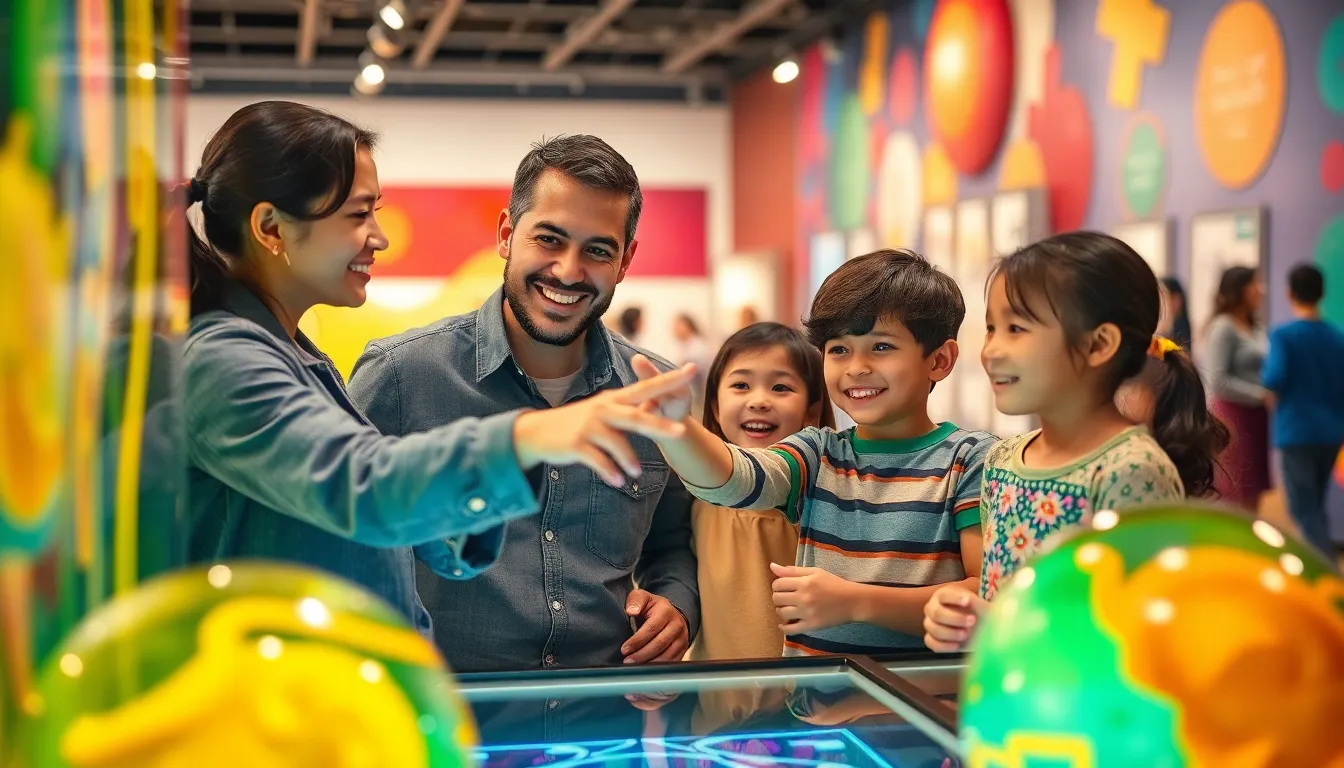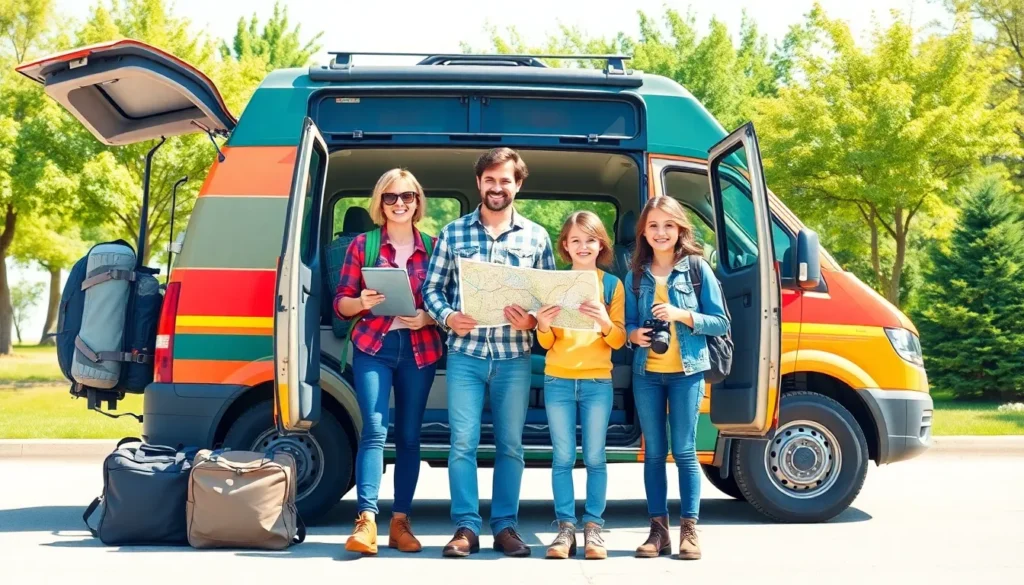Imagine trading the usual beach towels for history books or swapping amusement park lines for museum tours. Educational family trips are more than just a way to escape the daily grind; they’re a chance to bond while expanding young minds. Who knew learning could be so much fun?
These adventures transform family time into an engaging classroom on the go. From exploring ancient ruins to diving into science at interactive exhibits, families can create memories that last a lifetime—and maybe even spark a new passion in the kids. So buckle up and get ready to turn the family road trip into a journey of discovery that’s both entertaining and enlightening. After all, who said you can’t learn something new while having a blast?
Table of Contents
ToggleOverview of Educational Family Trips
Educational family trips transform typical vacations into enriching experiences. These trips often include visits to museums, historical sites, and cultural landmarks. Parents and children share the joys of discovery together, fostering bonds through shared learning.
Families can explore science centers and nature parks, making education interactive and stimulating. Each destination offers unique perspectives that spark curiosity in children and adults alike. Through hands-on activities, families engage in topics like ecology, history, or technology.
Planning itineraries around educational experiences encourages children to broaden their horizons. Children gain knowledge about different cultures, environments, and historical events. Engaging in interactive exhibits or guided tours enhances comprehension and retention of information.
Making learning enjoyable creates lasting memories. Families often reflect on these trips, reinforcing lessons learned. Educational family trips position learning as an adventure rather than a chore.
Incorporating local educational opportunities ensures trips are dynamic and memorable. Families may participate in workshops or community events that highlight local history or traditions. Each trip strengthens family bonds while enriching children’s educational journeys.
Benefits of Educational Family Trips

Educational family trips provide valuable opportunities for growth and connection. They enable families to engage in meaningful activities that combine learning and adventure.
Enhancing Learning Experience
Interactive visits to museums, science centers, and cultural landmarks enhance the learning experience significantly. Children absorb knowledge differently when they explore places rather than learning in traditional classrooms. Engaging with exhibits promotes curiosity, fostering a desire to learn more about the world. Educational trips often introduce real-life applications of what kids learn in school. This practical exposure can spark new interests, encouraging them to pursue subjects further. Parents can support different learning styles during these trips, allowing each child to thrive in their unique way. Exploring diverse environments also nurtures cultural awareness, broadening their understanding of global perspectives.
Strengthening Family Bonds
Family trips create shared experiences that strengthen relationships. Spending time together in new locations fosters connection and communication among family members. Conversations naturally arise during travel, leading to deeper discussions and understanding of each other’s viewpoints. Participating in group activities, like workshops or tours, encourages teamwork and collaboration. Families can also reflect on their adventures together, building lasting memories. Confronting challenges on the road, like navigating unfamiliar places, often brings families closer. These moments of joy and collaboration make educational trips unforgettable experiences that reinforce family unity.
Popular Destinations for Educational Family Trips
Families often seek destinations that combine learning and adventure. Many attractive options cater to various interests and age groups.
National Parks and Natural Wonders
National parks offer breathtaking landscapes and abundant wildlife. Families can explore parks like Yellowstone, known for geothermal features and diverse ecosystems. Yosemite’s granite cliffs provide opportunities for geology lessons. While hiking, children learn about plant species and animal habitats. Many parks also host ranger-led programs that teach about conservation and environmental science. Nature trails, guided tours, and interactive exhibits enhance the connection between families and the environment.
Historical Sites and Museums
Historical sites and museums present rich learning experiences. Families visiting Washington, D.C., can explore the Smithsonian Institution’s museums, covering American history and innovation. Sites like Gettysburg provide firsthand insights into Civil War history. Interactive exhibits at the American Museum of Natural History engage children with biology and anthropology. Local heritage sites often conduct workshops that illustrate the significance of cultural traditions. These visits foster a deeper understanding of history and encourage discussions about the lessons learned.
Planning an Educational Family Trip
Planning an educational family trip involves careful consideration of destinations and budgeting to maximize learning experiences. Thoughtful planning ensures that the journey enriches the entire family.
Choosing the Right Destination
Selecting an appropriate destination requires identifying interests and educational themes. Popular choices include national parks, where geology and ecology come alive through hands-on experiences. Museums and historical sites offer insights into culture and history, making subjects engaging for children. Families should evaluate distance and accessibility when deciding. Consider local educational events or workshops that align with the learning goals. Additionally, opting for destinations with diverse activities ensures every family member stays engaged, transforming travel into a captivating educational journey.
Budgeting and Saving Tips
Budgeting for an educational trip often entails prioritizing learning experiences over extravagant expenses. Families can find numerous ways to save money. Start by researching free or low-cost attractions that provide educational value. Look for deals on accommodations, enabling stays at family-friendly hotels or camping sites. Planning meals can also reduce costs; packing lunches for day trips proves beneficial. Establishing a clear budget ahead of time sets expectations and encourages mindful spending. Families can track expenses during the trip to avoid overspending and gather the most from their educational adventure.
Educational family trips offer a unique blend of adventure and learning that enriches the travel experience. By choosing destinations that inspire curiosity and promote engagement families can create lasting memories while expanding their knowledge. These trips not only strengthen bonds but also nurture a love for learning in children.
Whether exploring national parks or visiting historical landmarks each journey presents an opportunity for discovery. Families can transform ordinary vacations into extraordinary educational adventures that inspire and connect them. Embracing this approach to travel makes every family trip a chance to grow together and explore the world in a meaningful way.





